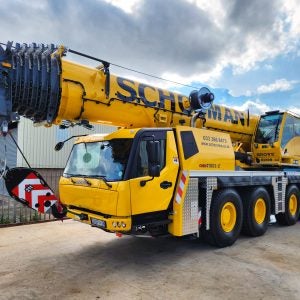The power plants replace diesel electric power packs generally used to power the crane during moving and lifting operations. Rather than drawing power at a varying rate, as it is needed for lifting, the diesel engine works at a constant rate, storing power in a lead-acid battery. This means a smaller diesel engine can be used, which needs only to work at the average rate for the crane’s use, and not reach higher power levels needed for lifting. Regenerating the batteries when hoisting down further increases fuel efficiency.
Overall, fuel savings of 74% were achieved using the system, developed by Railpower, a Canadian company with a background in developing hybrid power systems for trains. Using the hybrid diesel/battery systems, TSI’s cranes burned diesel during typical active duty cycles at a rate of 2.08gal/h for a fuel power efficiency of 12kWh/gal. Using a normal diesel electric power pack the cranes would guzzle fuel at a rate of 8gal/h.
TCI vice president of engineering and maintenance Joe Murphy said, “We liked the hybrid approach because it inherently incorporates all the strategies for reducing fuel usage and emissions reduction. The Railpower hybrid solution was chosen because it offered an impressive reduction in fuel consumption and by far the largest emission reductions.” TSI president and CEO Norman Stark added, “The hybrid conversion of TSI’s RTG cranes is one of our key initiatives to reduce emissions. Last year, we were the first container terminal in Canada to implement a biodiesel fuel program. Our commitment to the environment is to further reduce emissions and our impact on the natural environment wherever practicable.”






